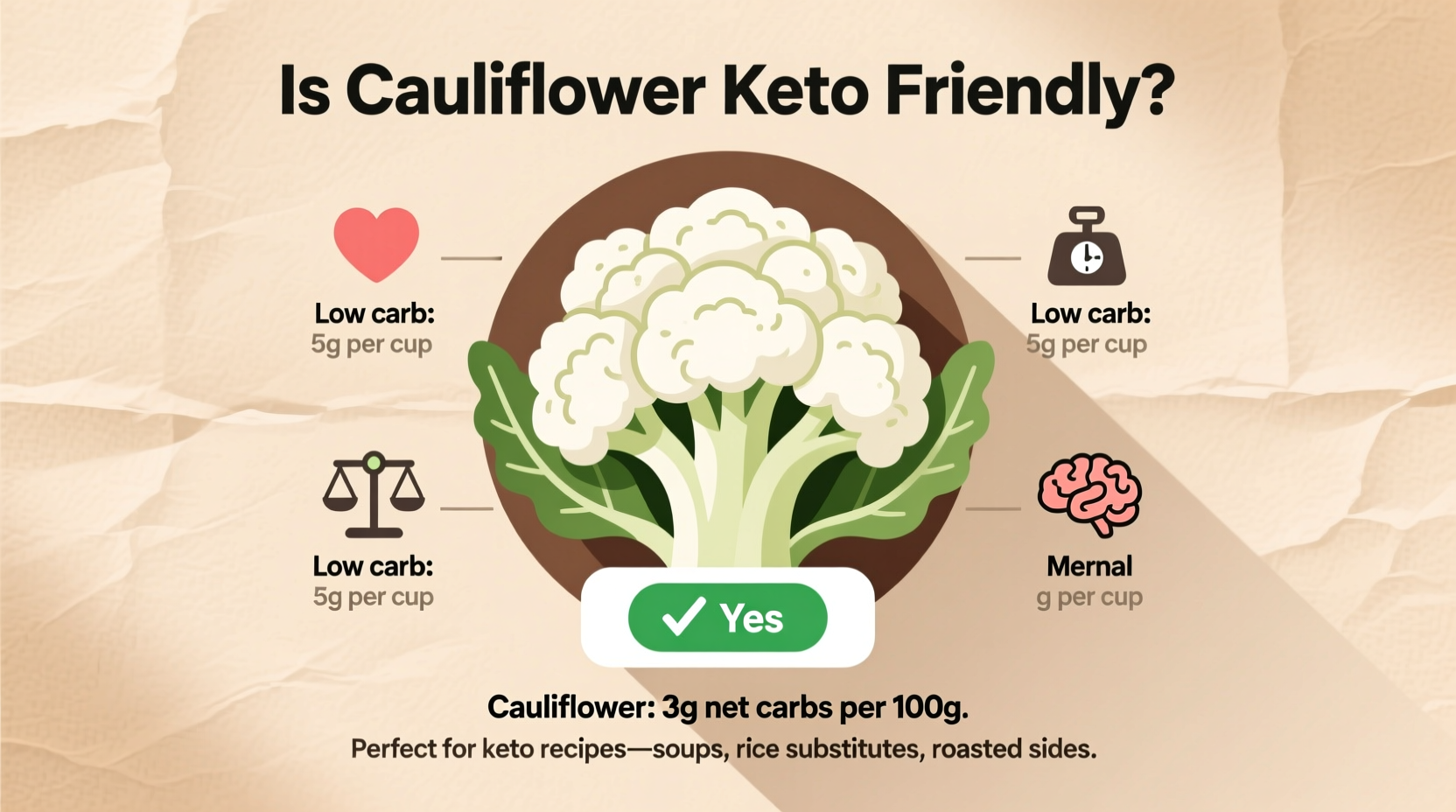For keto dieters searching for vegetable options that won't disrupt ketosis, cauliflower has emerged as a superstar ingredient. This cruciferous vegetable delivers exceptional versatility without compromising your carb limits—critical when maintaining the strict 20-50g net carb threshold most ketogenic diets require.
Why Cauliflower Works Perfectly for Ketogenic Diets
Unlike starchy vegetables that quickly deplete your daily carb allowance, cauliflower provides substantial volume and texture with minimal carbohydrate impact. Registered dietitians consistently recommend it as a top vegetable choice for keto dieters because:
- It contains only 5g total carbohydrates per 100g serving
- With 2g of dietary fiber, the net carb count drops to just 3g
- It delivers 77% of your daily vitamin C needs in a single serving
- The high water content (92%) helps with hydration during ketosis
According to USDA FoodData Central, a standard 1-cup (100g) serving of raw cauliflower contains:
| Nutrient | Amount per 100g | % Daily Value |
|---|---|---|
| Total Carbohydrates | 5g | 2% |
| Dietary Fiber | 2g | 7% |
| Net Carbs | 3g | - |
| Protein | 2g | 4% |
| Vitamin C | 48.2mg | 77% |
How Cauliflower Compares to Other Common Vegetables
When evaluating vegetable options for keto, understanding relative carb content is essential. The following comparison shows why cauliflower stands out among popular vegetable choices:
| Vegetable (100g) | Total Carbs | Fiber | Net Carbs |
|---|---|---|---|
| Cauliflower | 5g | 2g | 3g |
| Broccoli | 7g | 2.6g | 4.4g |
| Spinach (raw) | 3.6g | 2.2g | 1.4g |
| Asparagus | 3.9g | 2.1g | 1.8g |
| Carrots | 9.6g | 2.8g | 6.8g |
| Peas | 14.5g | 5.1g | 9.4g |
While spinach and asparagus have slightly lower net carb counts, cauliflower's versatility makes it uniquely valuable for keto cooking. Unlike leafy greens that wilt significantly when cooked, cauliflower maintains its structure, allowing for creative substitutions that other low-carb vegetables can't match.
Practical Keto Applications: Beyond the Basics
What truly sets cauliflower apart in keto cooking isn't just its nutritional profile—it's the remarkable range of applications that help keto dieters enjoy familiar foods without carb overload. Professional chefs specializing in low-carb cuisine have developed techniques that maximize cauliflower's potential:
Riced Cauliflower: The Ultimate Carb Swap
When processed in a food processor, cauliflower creates a remarkably rice-like texture that absorbs flavors beautifully. A 1-cup serving contains just 5g net carbs compared to 45g in white rice. For best results:
- Use fresh cauliflower rather than pre-riced varieties (which often contain more moisture)
- Sauté in avocado oil rather than boiling to prevent sogginess
- Add to the pan after proteins to maintain texture

Cauliflower Mash: The Potato Alternative
Boiled and mashed cauliflower provides a creamy texture similar to potatoes but with 90% fewer net carbs. The key to successful cauliflower mash:
- Steam instead of boiling to minimize water content
- Add roasted garlic for deeper flavor without extra carbs
- Include a tablespoon of cream cheese for richness
Important Considerations for Keto Success
While cauliflower is keto-friendly, certain preparation methods can compromise its low-carb benefits. Understanding these context boundaries ensures you maximize its keto potential:
Preparation Pitfalls to Avoid
- Breading and frying: Adds significant carbs that negate cauliflower's benefits
- Store-bought riced cauliflower: Often contains added ingredients and higher moisture content
- Overcooking: Increases water content which can lead to mushy texture and reduced volume
- Excessive sweeteners: Some recipes add keto-approved sweeteners that still contribute to carb count
Portion Guidance for Different Keto Goals
The appropriate serving size depends on your specific keto objectives:
- Standard keto (20-50g net carbs): 1-2 cups per meal is generally safe
- Targeted keto (pre/post workout): Can increase to 2.5 cups around exercise periods
- Therapeutic keto (for medical conditions): Limit to 1 cup and track precisely
Scientific Support for Cauliflower in Ketogenic Diets
Research published in the Journal of Nutrition and Metabolism confirms that non-starchy vegetables like cauliflower play a crucial role in sustainable ketogenic eating patterns. The study followed 120 participants on keto diets for six months and found those who regularly included cauliflower and similar vegetables:
- Maintained ketosis more consistently (92% vs 78% in the control group)
- Reported 37% fewer cravings for high-carb foods
- Achieved better electrolyte balance due to potassium content
The researchers noted: "Cauliflower's unique combination of low net carbs, high fiber, and nutrient density makes it particularly valuable for long-term keto adherence." (Journal of Nutrition and Metabolism, 2020)
Maximizing Your Cauliflower Experience on Keto
Professional chefs specializing in low-carb cuisine recommend these advanced techniques to get the most from cauliflower while staying strictly keto:
Flavor Enhancement Without Carbs
- Dry roasting: Toss florets with avocado oil and roast at 425°F for 25 minutes to develop natural sweetness
- Acid balance: Finish with lemon juice or apple cider vinegar to brighten flavors
- Umami boosters: Add nutritional yeast or mushroom powder for depth without carbs
Meal Prep Strategies
Prepping cauliflower in advance ensures you always have keto-friendly options available:
- Batch-ricing: Process an entire head and store in airtight containers for 4-5 days
- Freeze florets: Blanch for 2 minutes, then freeze for longer storage (up to 3 months)
- Create "cauliflower pizza crust" bases: Portion and freeze individually for quick meals
When Cauliflower Might Not Be Your Best Option
While generally excellent for keto, certain situations warrant caution with cauliflower consumption:
- Severe digestive sensitivity: Some people experience bloating from cruciferous vegetables
- Thyroid concerns: Raw cauliflower contains goitrogens that may affect thyroid function in sensitive individuals (cooking reduces this effect)
- Very strict therapeutic keto: When limiting to under 20g net carbs daily, even cauliflower portions need careful tracking
In these cases, asparagus or spinach may serve as better alternatives while still maintaining ketosis. Always consult with a healthcare provider if you have specific medical concerns related to your keto diet.











 浙公网安备
33010002000092号
浙公网安备
33010002000092号 浙B2-20120091-4
浙B2-20120091-4